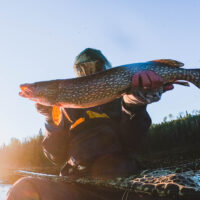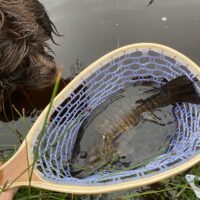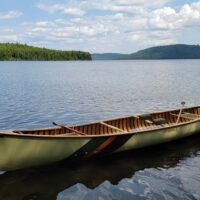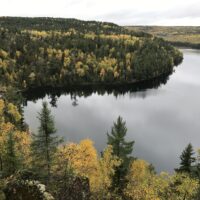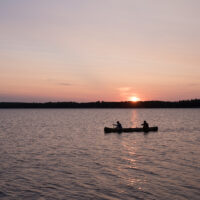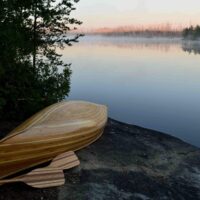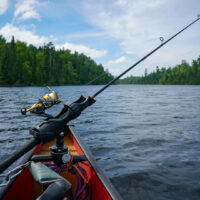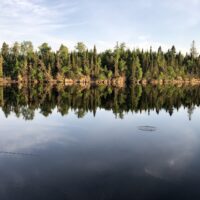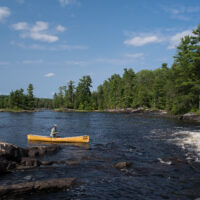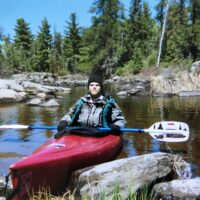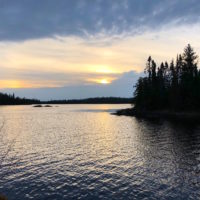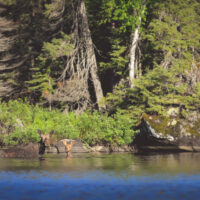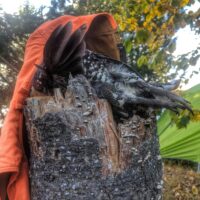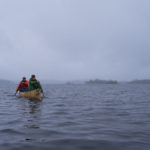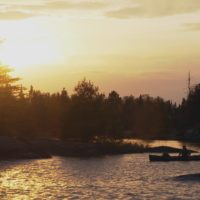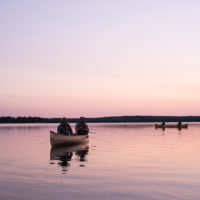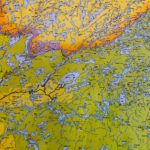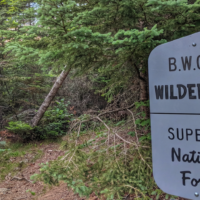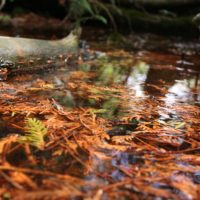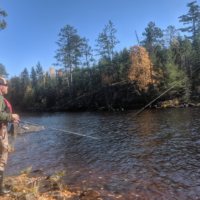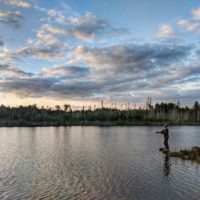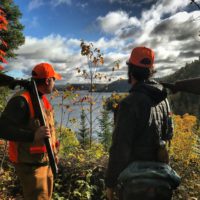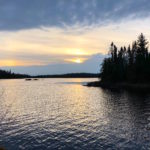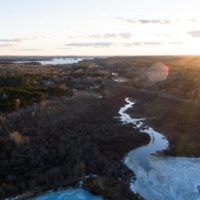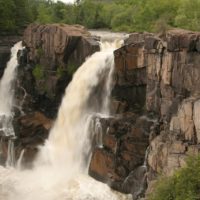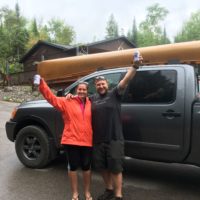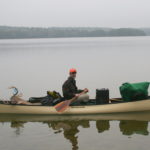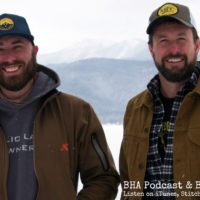The Next Chapter In Copper-Nickel Mining
April 4, 2023 2:36 pmWhat’s on the horizon, and what are the next steps in our ongoing efforts to protect the Boundary Waters
“It was before dawn, that period of hush before the birds had begun to sing. The lake was breathing softly as in sleep; rising and falling, it seemed to me to absorb like a great sponge all the sounds of the earth. It was a time of quiet – no wind rustling the leaves, no lapping of the water, no calling of animals or birds. But I listened just the same, straining with all my faculties toward something – I know not what – trying to catch the meanings that were there in that moment before the lifting of the dark.
Standing there alone, I felt alive, more aware and receptive than ever before. A shout or a movement would have destroyed the spell. This was a time for silence, for being in pace with ancient rhythms and timelessness, the breathing of the lake, the slow growth of living things.”
Silence, The Singing Wilderness, Sigurd F. Olson
Great News for the Boundary Waters
Thanks to your steadfast advocacy and the work of so many other hunters, anglers, and supporters of Sportsmen BWCA’s mission, 2023 has brought great news for America’s most-visited Wilderness. Just in the last few months, thanks to the conservation efforts of hundreds of thousands of people and years of tireless advocacy, we saw monumental protections announced across the country for three of America’s most iconic, wild landscapes in the Boundary Waters, and in Alaska’s Bristol Bay and the Tongass National Forest.
In January, 2023, the Biden Administration’s Department of Interior cemented historic protections for the Boundary Waters by signing an order to withdraw approximately 225,504 acres of public lands in the BWCA Watershed in Northeastern Minnesota from federal mineral leasing. This withdrawal order is the federal protection Sportsmen for the Boundary Waters has long advocated for, and is the culmination of thousands of written comments, in-person testimony and advocacy from across the country.
What does this announcement mean?
The recent order to ban new hardrock mineral leasing upstream of the Boundary Waters, in combination with the Department of the Interior’s cancellation of two federal mineral leases associated with the proposed Twin Metals project on January 26, 2022, effectively halted the development of any federal hardrock mineral leases upstream of the Boundary Waters. In addition, the federal government is no longer required to evaluate a specific mine plan of operations (MPO), complete additional environmental review, including calling for and reviewing public comments, or proceed with any plans to approve any new hardrock mining upstream of the Boundary Waters. While federal hardrock mineral leases remain available for bidding in certain parts of the Boundary Waters watershed, the immediate threat of development of a copper-nickel mine upstream of the BWCA has been halted. Now is the time for hunters and anglers to continue their vocal support for permanent protection of the BWCA, in multiple venues that could lead to additional protections for the Boundary Waters.
In addition, the Minnesota Department of Natural Resources has announced that “given the impacts of this federal action on the project as proposed, the (Minnesota) DNR has notified Twin Metals that we have stopped work on the State’s environmental review.”
The combination of no state agency tasked with reviewing any proposal by Twin Metals, in addition to the lack of any ongoing federal review of any hardrock mining projects, gives Sportsmen for the Boundary Waters confidence that the development of any hardrock mineral leases on state and federal lands upstream of the BWCA is less likely than it was at SFBW’s founding, thanks to you, everyone who took action, donated money, time and told your friends and family about the ongoing threat to one of our greatest shared resources, the Boundary Waters.
Legislation at the federal and state level to protect the Boundary Waters
With the administrative review of any proposals to mine hardrock minerals upstream of the Boundary Waters complete, legislative efforts to protect the Boundary Waters remains the best opportunity to ensure lasting protections for the BWCA. The path to pass any legislation through the United States Congress is often a long, complicated process, but it is critical to ensuring long-term protections for the Boundary Waters.
In January 2023, U.S. House Rep. Betty McCollum (D-MN) reintroduced The Boundary Waters Wilderness Protection and Pollution Prevention Act in the 118th Congress. This legislation, which would codify permanent protections for the BWCA from hardrock mining into law, was first introduced by a bipartisan group of elected officials in the House of Representatives in January 2020, as H.R. 5598, and then reintroduced in April 2021, as H.R. 2794. Sportsmen for the Boundary Waters’ Executive Director, Lukas Leaf, said the following about this legislation when it was introduced in 2023:
“On the heels of the recently announced 20-year mineral withdrawal, this important legislation represents the final step towards ensuring the Boundary Waters is protected in perpetuity from sulfide-ore copper mining for future generations of hunters, anglers, and paddlers. We urge all outdoor enthusiasts from across the country to contact their members of Congress to express support for this critical bill.”
While the effort to protect the Boundary Waters proceeds in Congress, parallel legislation was recently introduced to permanently protect state lands in the BWCA watershed in the Minnesota State legislature. In January 2023, Minnesota State Representative Sandra Feist and State Senator Kelly Morrison introduced HF 329 and SF 167: The Boundary Waters Permanent Protection Act. Sen. Morrison’s and Rep. Feist’s bills would ban sulfide-ore copper mining on state land and prohibit the issuance of new state permits, licenses, or leases for sulfide-ore copper mining in the Rainy River Watershed. While the federal mineral withdrawal order permanently protects the majority of mineral leases within the watershed of the Boundary Waters, state lands upstream of BWCA with potential for hardrock mineral development remain an important piece of the puzzle to ensuring the Boundary Waters is conserved for future generations.
How to support ongoing work to protect the Boundary Waters
Sportsmen for the Boundary Waters cannot thank you enough for your ongoing support and continued advocacy for a place that means the world to so many of us. Without you, it’s hard to imagine where the effort to protect America’s most-visited Wilderness would be today.
The best way to support Sportsmen for the Boundary Waters, and ongoing efforts to protect habitat and wildlife for future generations of hunters and anglers, is to make a donation through our website, become a sustaining donor, or by mail. Still, there are many ways that you can contribute.
As the state of Minnesota moves forward with a conservation framework that allows for the protection of our public lands and waters, as well as the responsible development of iron ore, taconite, logging, and other industries that have existed in Northern Minnesota for generations, Sportsmen for the Boundary Waters remains committed to protecting the integrity of the Boundary Waters Canoe Area Wilderness and its watersheds for huntable and fishable populations of fish and wildlife, now and forever through advocacy and education.
Do you want to support our important work moving forward? Click here to make a one-time gift, or sign up as a sustaining donor.
You can support Sportsmen BWCA’s ongoing work by sending a check, made out to Sportsmen for the Boundary Waters, to P.O. Box 743, Ely, MN 55731 Contributions will go to Sportsmen for the Boundary Waters (SFBW). SFBW is recognized by the Internal Revenue Service as a section 501(c)3 nonprofit organization. Contributions to SFBW are tax-deductible to the full extent of the law.
Categorised in: Blog, Fishing, Hunting, News, Partnerships



















